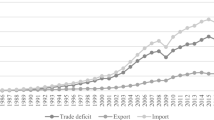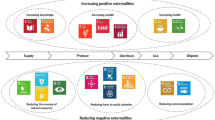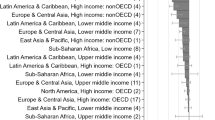Abstract
In the course of the last United Nations' World Trade Conference (UNCTAD) the Soviet Union, Ivory Coast and Bulgaria signed the agreement on the Common Fund for Commodities. The Fund, which was conceived as the cornerstone of a new international commodities policy, will thus come into effect in the near future, probably in the course of 1988. Will this leadt o a new departure for international commodities policies?
Similar content being viewed by others
References
For a critique of compensatory financing systems cf. for STABEX C. D. A. Cuddy: Compensatory financing in the North-South dialogue: the IMF and STABEX systems, in: The Journal of World Trade Law, Vol. 13, 1979, pp. 66–76; and for SYSMIN W. Maennig: SYSMIN: An Evaluation, in: INTERECONOMICS, Vol. 23, No. 1, 1988, pp. 35–38.
For a more detailed description cf. for example H. Adebahr: Gemeinsamer Rohstoff-Fonds: Zwischen politischem Erfolg und wirtschaftlichem Fehlschlag, in: Wirtschaftsdienst, 1979, Vol 59, No. 12, pp. 616–622; J. D. Gerber: Der Gemeinsame Rohstoff-Fonds, in: Außenwirtschaft, Vol. 35, 1980, pp. 355–371; B. Stecher: Der “Gemeinsame Rohstoff-Fonds”, in: Europa-Archiv, Vol. 36, 1981, pp. 57–64; also U. Wassermann: UNCTAD: Agreement on the Common Fund, in: The Journal of World Trade Law, Vol. 14, 1980, pp. 541–545.
Whilst for example S. Baron, H. H. Glismann and B. Stecher: Internationale Rohstoffpolitik—Ziele, Mittel, Kosten— 1977, p. 15 confirm the presence of a pooling effect, its existence is questioned by, for example, H. G. Johnson: Commodities: Less Developed Countries' demand and Developed Countries' response, in: J. N. Bhagwati (ed.): The New International Economic Order, Cambridge 1978, p. 244.
Cf. H. Adebahr, W. Maennig: Außenhandel und Weltwirtschaft, Außenwirtschaft, Vol. 2, Berlin 1987, pp. 327 ff.
Éven the suggested “crawling peg” system—a sliding adjustment to market price tendencies—failed to become reality. Cf. D. Kebschull: A crawling peg system for raw materials, in: INTERECONOMICS, Vol. 11, No. 9, 1976, pp. 245–7, for a description of this form of flexible adjustment.
For an estimation of storage costs cf. J. Colebrook: The costs of storing primary commodities, in: Journal of World Trade Law, 1977, pp. 369–377.
Cf. W. Maennig: Die Effekte der Preisstabilisierung auf Erlöshöhe und-stabilität, Berlin 1985 and the literature referred to therein.
S. Baron, B. Stecher, H. H. Glismann, op. cit., Internationale Rohstoffpolitik—Ziele, Mittel, Kosten—1977, pp. 8f.
Cf. for example Adebahr, op. cit., Außenhandel und Weltwirtschaft, Außenwirtschaft, Vol. 2, Berlin 1987, pp. 327 ff. 1979; and D. Kebschull: The foreseeable end of the Common Fund, in: INTERECONOMICS, 1982, Vol. 17, No. 4, pp. 157–8.
Examples of inverse supply reactions can be found in H. Oberhänsli: Internationale Rohstoffpolitik im Zeichen von Instabilität und Inflation, St. Gallen 1982, pp. 325 f.; and M. Hoffmeyer, J. V. Schrader: Preistief auf den Rohstoffmärkten, in: Die Weltwirtschaft, 1982, No. 2, p. 115.
Cf. also D. Avramovic: Commodity problem: what next?, in: World Development, 1987, Vol. 15, pp. 645–655.
D. Avramovic, op. cit. Commodity problem: what next?, in: World Development, 1987, Vol. 15, pp. 650.
Author information
Authors and Affiliations
Rights and permissions
About this article
Cite this article
Maennig, W. A new departure in international commodities policies?. Intereconomics 23, 121–125 (1988). https://doi.org/10.1007/BF02925150
Issue Date:
DOI: https://doi.org/10.1007/BF02925150




